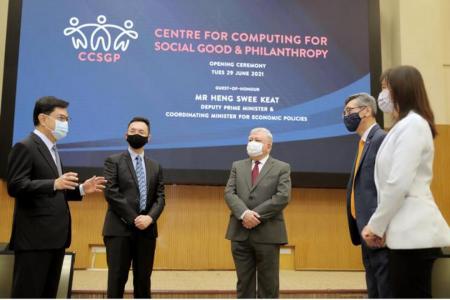New NUS centre gives computing students a chance to serve community
The centre is rolling out programmes for those with autism, needy kids and social service agencies
A new centre at the National University of Singapore (NUS) is rolling out a raft of special programmes for people with autism, children from low- income homes and social service agencies.
The initiatives, which offer NUS computing students opportunities to take part in community service, are helmed by the Centre for Computing for Social Good and Philanthropy, which was launched yesterday at the NUS School of Computing.
COLLABORATE
One programme lets undergraduates collaborate with the Autism Resource Centre and Pathlight School to help people with autism acquire practical infocommunications technology or information technology (IT) skills to boost their employability.
It is based on a pilot scheme in 2019, when NUS computing students mentored adult beneficiaries in the Autism Resource Centre's IT interest club in topics such as basic robotics, JavaScript and Web development.
The NUS centre will also continue a coding project introduced in 2017, when its computing students volunteered to teach underprivileged beneficiaries.
For example, the students gave coding lessons to young children from low-income families.
From 2017 to 2019, more than 25 such courses were conducted for more than 200 participants.
The centre will also run a summer attachment programme, started in 2007, for students to help put in place IT systems to boost the efficiency of social service agencies. More than 10 agencies, such as Lions Befrienders Service Association and Movement for the Intellectually Disabled of Singapore, have benefited from it.
The centre was set up with a gift of $1.5 million from the Mrs Lee Choon Guan Trust Fund, which supports initiatives linked to healthcare and education.
INCLUSIVE
Deputy Prime Minister Heng Swee Keat, the guest of honour at the launch, said the push for an inclusive digital society must continue as digital disruptions gain momentum in the future.
Mr Heng, who is also Coordinating Minister for Economic Policies, said the pandemic has quickened the pace of digitalisation and Singapore must build on its progress and speed up its Smart Nation journey.
He said: "As we become more advanced as an economy and develop as a society, we can also become a more caring and inclusive society.
"This spirit of solidarity and unity, at a time when the world is becoming more uncertain and complex, will enable us to thrive in a more digital post-Covid-19 world."
The centre will also roll out a leadership programme and fellowship programme for students.
In the leadership programme, students will learn the principles of leadership and apply them in practical settings, such as community projects with a welfare organisation.
In the public service fellowship programme, students will propose and undertake independent community service projects.
Students can apply for funding of up to $3,000 to develop such projects or seek support for existing projects.
Get The New Paper on your phone with the free TNP app. Download from the Apple App Store or Google Play Store now


